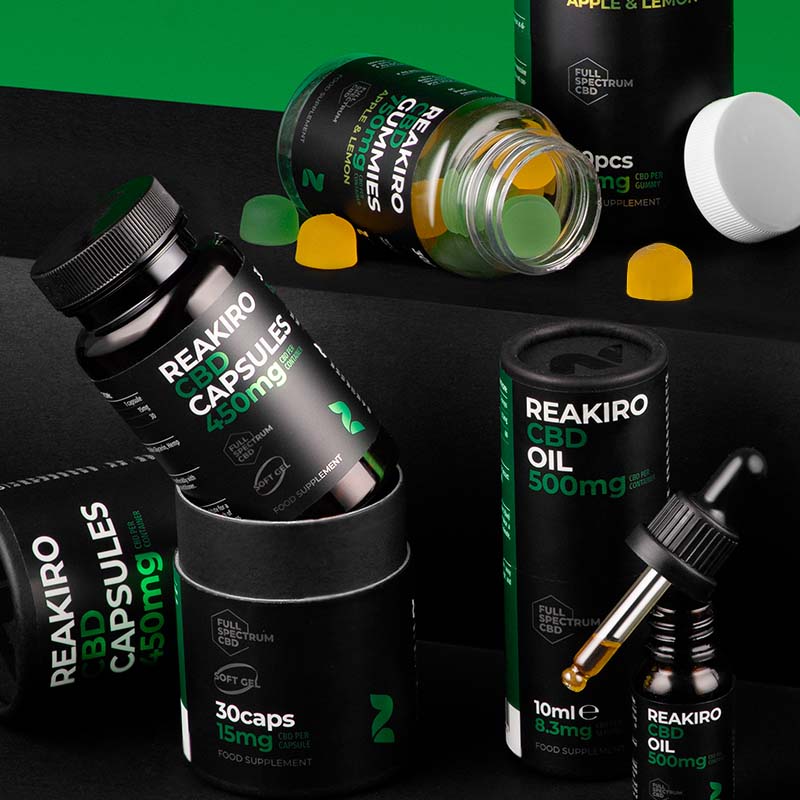Table of Contents
Full Spectrum VS Broad Spectrum VS Isolate CBD
If you have at least once encountered products containing CBD, you could notice the unusual inscriptions on the packaging that characterize such products. Most often, it is:
- Isolate CBD, or cannabidiol isolate;
- Broad-spectrum CBD – a broad-spectrum product;
- Full-spectrum CBD – a full-spectrum CBD product.
What are these designations, and how do they differ from each other? Let's take a closer look and find the pros & cons of full-spectrum CBD and the available variants.
What Is Full-Spectrum CBD?
Full-spectrum CBD is a full-spectrum concentrate. Depending on the extraction method, it contains CBD from 40 to 99%, and the rest of the "bouquet" – includes terpenes, flavonoids, and even THC. The same tetrahydrocannabinol provides a euphoric effect. If THC in the product is not more than 0.3%, such a product is considered legal.
CBD Terpenes are chemical substances of plant origin that give hemp its characteristic aroma. Even in small amounts, CBD terpenes are strong and interact perfectly with cannabinoids to improve the body.
Moreover, the complex of terpenes and flavonoids plays an essential role in metabolic and anti-inflammatory processes, but THC, in combination with CBD, causes the so-called entourage effect. What are the pros & cons of full-spectrum CBD?
Pros:
- The presence of several cannabinoids causes the expected “entourage effect”.
- Terpenes and other substances benefit your health.
Cons:
- Include THC.
- Cause different effects depending on the content.
- Most expensive
What Is Broad-Spectrum CBD?
Broad-spectrum CBD is also a whole cocktail of components extracted from cannabis. But it is completely purified from THC – tetrahydrocannabinol molecules are removed from the concentrate and are not present in the products even in the amount specified by law.
Pros:
- No THC.
- Perfect for those who may have regular drug tests at work.
- High quality.
- You can find a specific blend of cannabinoids according to your needs.
Cons:
- May reduce the effect of cannabinoids.
- It is tough to remove THC from hemp extracts completely.
What Is Isolate CBD?
CBD isolate, on the other hand, is a more technologically complex product because, after extraction, the cannabis concentrate is purified from impurities to reach a pure CBD concentration of 99% or even 100%. To do this, after extraction, the oil is subjected to steam or heating with further filtration. As a result, a product in the form of crystals consisting entirely of CBD is obtained.
Isolated CBD is especially valued for its pure and precise effect, the need for a small dosage, and the possibility of using them in different forms – crystals can be added to cosmetics or medicinal ointments, absorbed or diluted in liquids, and added to food.
Pros:
- No terpenes, flavonoids, and other cannabinoids, including psychoactive THC.
- Optimal for people who drive a car and are engaged in other activities that require a high concentration of attention.
- Does not give a positive drug test result.
Cons:
- It requires more work and has a high price.
Which Type of CBD to Choose?
You know what CBD isolate, distillate, and full spectrum CBD are and what these terms mean. What product to choose? Which one is right for you? Let's compare:
- Full Spectrum: CBN, CBC, CBG, CBD + more cannabinoids + THC
- Broad Spectrum: CBN, CBC, CBG, CBD + more cannabinoids, but NO THC
- Isolate CBD: just CBD
The Verdict
As you can see, the difference between CBD products is huge. Remember to carefully study the packaging, label, and instructions for your chosen product, and give preference only to proven manufacturers who can make safe and valuable CBD products.



